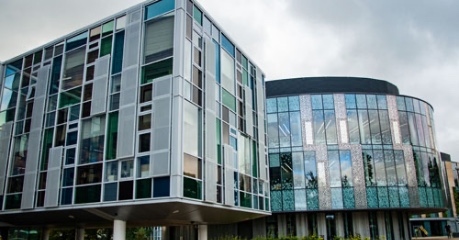Friday 26th May 2023, 11:15am
The Roslin Institute is benefiting from a share of £376m to support its research into pioneering animal bioscience, and is one of eight UK scientific establishments that will benefit from the investment from the Biotechnology and Biological Sciences Research Council (BBSRC).
The strategic funding from BBSRC, part of UKRI, will support research into genes and traits for healthy animals and prevention and control of infectious diseases.

Investment of £35.5m from the BBSRC will support pioneering research in animal bioscience at the Roslin Institute over 5 years, to help further understand the genetics of healthy animals and how to mitigate infectious diseases.
It will enable Roslin’s experts to develop the Institute’s overall research themes of sustainable agriculture, controlling diseases and enhancing health.
The Roslin Institute is a centre of expertise for collaborative research and stakeholder engagement, in veterinary immunology, microbiology, epidemiology, and farmed animal genetics and animal biotechnology.
Roslin’s research into healthy genes and traits aims to understand how genetic variation between animals in key farmed species affects their biology and interactions with their environment.
This work is underpinned by studies on how animals’ genetic codes are organised, how these function and are regulated, as well as research on how cells, tissues and body systems develop and operate through life.
This research coordinates the functional annotation of animal genomes, and underpins precision breeding of animals.
The BBSRC funding will also support research to reduce the burden of infectious animal diseases and the health threat they pose to humans, by improving their detection, treatment and prevention.
Experts at Roslin aim to develop scientific understanding of how disease resistance is passed between generations, the resilience of farmed animals to diseases, and to define the basis of natural and vaccine-mediated immunity.
They are also studying how infectious agents evolve and cause disease, and how diseases and drug resistance spread in populations.
BBSRC’s strategically supported institutes are a vital component of the national and international bioscience research and innovation ecosystem. As experts in their fields, these world-class research institutes provide the UK with the capability and connectivity needed to ensure the UK remains at the forefront of the bioscience revolution.
"The investment BBSRC is making in its strategically supported institutes over the next five years will help deliver novel bio-based solutions to some of the greatest challenges we face as a society.
"Bioscience shapes our lives in so many different ways and as the UK’s major public funder of bioscience research and innovation, it is mission critical that BBSRC invests in world-class science that delivers benefits to society as a whole while driving economic growth and prosperity across the UK and beyond."
Professor Melanie Welham, Executive Chair at BBSRC"The world is facing a number of major challenges from the climate emergency, food supply security, a growing risk of deadly disease pathogen pandemics, air and water pollution and the urgent need to harness new green energy.
"These challenges are complex and interconnected and will require a concerted effort from the scientific community to harness our knowledge of biological systems to address.
"This £376m investment for UK biosciences announced today will help build on the UK’s longstanding leadership in bioscience – from plant science, to gut biome and nutrition, new biofuels, disease resistant crops and tropical diseases to help attract and retain the best and brightest scientists from around the world, drive innovation and economic growth through the Bioeconomy and help the UK’s Science Superpower mission to better harness science and technology for global good."
George Freeman, Minister of State for Science, UK Department of Science, Innovation and Technology"We are rightly proud of the Roslin Institute as a national capability and international exemplar of pioneering animal bioscience.
"We look forward to building on all that we have achieved so far and furthering our contribution to science in this next phase of our work."
Professor Bruce Whitelaw, Director, the Roslin InstituteRoslin Innovation Centre opened in August 2017 following a £30 million investment by the Biotechnology and Biological Sciences Research Council (BBSRC), The University of Edinburgh and the Scottish Government.
BBSRC’s investments help bioscience deliver world-class outputs, outcomes and impacts to society and the economy. In 2021/22, BBSRC expenditure was £438 million.
In the 2022 collection of impact stories arising from BBSRC investments, this featured the economic analysis of research at the Roslin Institute, and the contribution of almost £20 billion annually to the global economy, largely through productivity improvements in agriculture and aquaculture.
The showcase also highlighted Roslin Innovation Centre-based tenant company, Beebytes, a social enterprise founded by two Roslin Institute scientists and a scientist from the University of Edinburgh as a great example of a spin-out from the Roslin Institute.
The company specialises in honeybee genetics and DNA analysis of pollinators and their environment.The community interest company helps beekeepers and bee farmers select and breed their preferred type of honeybee. Beebytes also works with groups looking at issues of genetic diversity, health, forage and habitat for both honeybees and other pollinators.